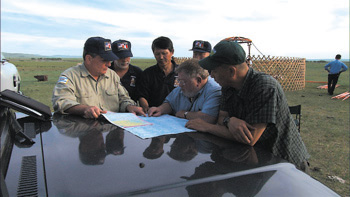 The
wrap of Khan? Hunting for Genghis's tomb
The
wrap of Khan? Hunting for Genghis's tomb
In
mid-August the announcement made news around the globe. A U.S.-Mongolian
expedition, including U of C history professor John Woods, had
discovered what may be the burial place of the 13th-century
Mongol ruler Genghis Khan.
The
expedition members emphasized that they aren't certain this
is the actual tomb, which if it follows Mongol custom could
contain large amounts of treasure; that they are still seeking
official permission to excavate the grave area next summer;
and that one bit of ambiguous evidence-pottery shards found
on the site's surface-may actually pre-date the era of Khan.
Nevertheless, the announcement caught popular and media imagination.

"The location of this site is intriguing," says Woods, U.S.
academic director for the Genghis Khan Geo-Historical Expedition,
established in 1995 by Chicago attorney Maury A. Kravitz. The
enclave of tombs, holding the remains of high-status Mongolian
tribespeople, lies not far from the town of Batshireet-200 miles
northeast of Ulaan Baatar, Mongolia's capital-on a hill near
Genghis Khan's probable birthplace and near the site where he
was proclaimed emperor of the Mongols. Some 20 unopened tombs
were found on a 600-foot elevation that is part of a walled
burial ground known locally as "the Almsgivers Castle," "Chinggis'
Castle," and "Red Rock." Another 40 unopened graves lie in the
enclave's lower area. Discovered during the expedition's second
season of surveying sites associated with Khan, the tombs are
encircled by a two-mile long, 9- to 12-foot high wall built
without mortar from a variety of stones.
Genghis Khan, whose original name was Temüjin, was born in 1162.
Succeeding his father at age 13 as head of his family, he quickly
demonstrated his military genius. By 1206 Temüjin was master
of almost all of Mongolia and was proclaimed Genghis Khan ("Oceanic
Lord"), leader of the united Mongol nation. He invaded northern
China, capturing Beijing in 1215, and then turned west, conquering
parts of the eastern Islamic world. At his death in 1227, his
armies controlled a landmass reaching from Beijing to the Caspian
Sea.
Kravitz,
an independent scholar who has studied the life of Genghis Khan
for 40 years, says that to discover his grave would be "the
find of all finds." Already, the expedition has had its share
of Indiana Jones-like moments: the team had to turn back from
its attempt to scale one possible burial site, deterred by Mongolian
hordes of horseflies that Woods said were "right out of a Hollywood
science-fiction film. They were large, they were multi-colored,
they were bad."
Despite
the flies, Woods-who primarily studies the history of Turkey,
Iran, and Central Asia from the 13th to 18th centuries and focuses
on the encounters of sedentary and nomadic peoples-has enjoyed
his first foray into archaeology, where "serendipity is so important."
The enclave, he explains, was found almost by accident, when
the team approached the site "with the idea of eliminating it"
from consideration.
Instead,
armed with the necessary permissions from the Mongolian government-and
plenty of insect netting-the team plans to return next summer
to determine if the site is truly the final resting place of
Genghis Khan. -
M.R.Y.

![]()
 The
wrap of Khan? Hunting for Genghis's tomb
The
wrap of Khan? Hunting for Genghis's tomb